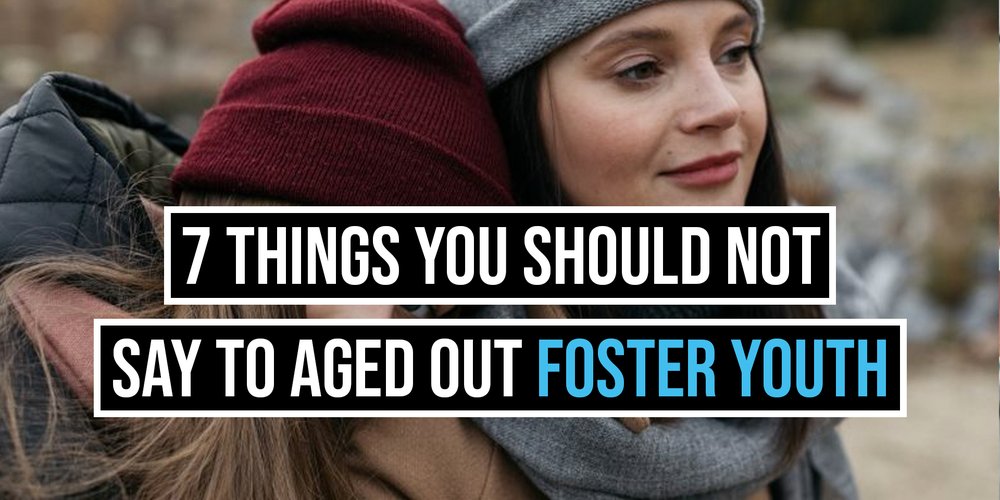7 Things You Should Not Say To Aged Out Foster Youth
Growing up in foster care is not always easy. Imagine aging out and not having a familiar support system. Who do you call when you get sick? Who helps you open a bank account? How do you get an apartment? In this day and age, that seems unfathomable to most people and yet, tens of thousands of aged-out foster youth face this reality.
Foster Love – Together We Rise works with many aged-out foster youth nationwide. So it is not surprising that they often share their experiences with us. One of the most common themes we find are stories of how people treat them. To help minimize some of the miscommunication we’ve created a list of the top seven things aged-out foster youth don’t need to hear.
1. “But it Made You Stronger”
Yikes! Often when people are opening up about their past, they just want to be heard. Please allow former foster youth the ability to share without comments like, “But it made you stronger.” At the time those people may have just wanted to be kids and feel safe. Rather than saying “But it made you stronger,” thank them for sharing this information with you. Opening up to someone isn’t always easy, be the person who is empathetic enough to understand that some comments are not necessary.
2. “Your Financial Aid Must Be Nice”
Sure, former foster youth can apply for scholarships and federal grants. But obviously, whatever aid they are granted is merited and doesn’t need to be vocalized. Only 3% of former foster youth graduate from college. Instead of commenting on their financial aid, ask about their classes or what they are studying. Find some common ground surrounding academics not what goes into funding them.
3. “Wow, I Wish I Didn’t Live With My Parents”
Humor is a defense mechanism that many people use. When most people say this, it is meant to be taken lightly. However, it is harmful to someone who didn’t have a say about whether they did or didn’t live with their parents. Rather than speaking to their parental situation ask aged out foster youth about what is currently going on with them. Be understanding of the fact that talking about their biological parents might not be appropriate.
4. “At Least You Made It Out”
Aged out foster youth experience a lot of difficult situations, sure. But this doesn’t mean you have the right to make comments on “making it out” or “being alive.” They may not feel like getting out was great and there are plenty of other topics to speak on. Consider chatting about their current plans. If they want to open up more on their foster experience let it happen organically and on their terms.
5. “It Could Have Been Worse”
Everything can be viewed through this lens and no one wants to hear “it could have been worse.” Regardless of the intention, if you are ever compelled to utter that phrase just say nothing. Silence can be okay and not always getting moved by your impulses is good.
6. “Foster Kids Get Tons of Hand Outs”
Is mentioning government assistance something that is pressing or your business? Not all states help aged out foster youth and if there are benefits, it doesn’t concern anyone but the person receiving them. Instead of chatting about benefits or money, try asking the person about their aspirations. What are they interested in doing professionally, or academically?
7. “You Don’t Look Like Your Were in Foster Care”
There are so many ways this statement is phrased. Ultimately, like the general population, aged out foster youth are a diverse population. The main indicator of someone being in foster care is their verbal disclosure of that experience. Being in foster care doesn’t make that a person’s identity but rather an experience. Comment on how you appreciate getting to learn more about them. Lend an ear, be a friend, and be present to learn about someone without judgment.
In Conclusion
We understand that people who say these things mean well. It is easy to be curious about how someone who grew up in care is thriving as an adult. Be open to just listening and letting the former foster youth share with you about their life organically. This is part of being an advocate and friend to current and former foster youth.
If you know or are a current or former foster youth, check out our Family Fellowship. It is the largest scholarship fund for foster youth and takes new applications from March through May 1st, each year. Learn more about the Family Fellowship HERE.


